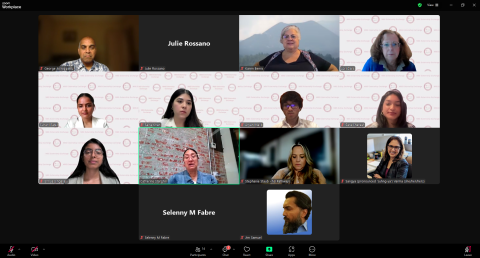The field of data science is rapidly evolving—marked by a 968 percent increase in data science bachelor’s degrees awarded between 2020 and 2022. In the summer 2024 semester, the Master of Business and Science (MBS) Externship Exchange program partnered with the New Jersey Big Data Alliance (NJBDA) and New Jersey (NJ) Pathways to tackle one issue faced by many students: credit transfer between institutions.
The NJ Pathways Initiative aims to offer students and workers clear career pathways for discovering new job opportunities while ensuring employers have access to a skilled workforce to address labor market demands. NJBDA is a statewide consortium of universities, colleges, and corporate partners that strives to generate a highly skilled workforce, drive innovation, and catalyze data-driven economic growth for New Jersey. Together, NJ Pathways and the NJBDA are collaborating on a Data Science Curriculum Alignment and Articulation Agreement Pathways project to improve data science curriculum alignment between two- and four-year institutions.
Setting the Standard
This Pathways project aims to unite four-year colleges and community colleges to evaluate and facilitate the transfer of more credits from community college graduates with Associate degrees in Data Science into bachelor's degree programs, allowing their credits to transfer for non-elective courses.
“The problem now is that the courses from the county colleges don't line up with the 4-year schools,” said Lori Dars, NJBDA member and one of the MBS Advisors on the team. “The reason that's a problem is the credits may transfer as an elective, but they don't transfer into the major, and as a result, students have to take more courses, which leads to longer graduation time and a financial burden.”
After a successful collaboration with NJBDA on a series of Externship fellowships for an EDA grant, a team of externs was chosen to work toward a solution on this project.
The MBS Externship Exchange program provides students with experiential learning. Under the guidance of MBS advisors and external mentors, students tackle problems from our partner organizations, companies, non-profits, and government agencies. At the end of the semester, each team of externs provides a short lightning talk presentation as well as a detailed presentation to hand off to partner organizations.
Since the program’s inception in 2016, the MBS Externship Exchange program has served 145 partner organizations and 2,200 total students.
Meet the Team
The initial team consisted of 5 students from Rutgers:
- Suhani Patel (Lead), MBS, User Experience Design
- Shriya Singaraju, SEBS, Biotechnology
- Saira Khan, SAS, Data Science & Computer Science
- Aryan Malik, SAS, Math & Economics & Computer Science
- Sara Shareef, SAS, Computer Science
Students were supported by MBS Advisors Dr. Karen Bemis, Assistant Director, MBS Externship Exchange Program, and Lori Dars, Senior Advisor.
Dr. George Avirappattu of NJBDA and Kean University served as team mentor, providing exceptional expertise and guidance.
Ensuring a Smooth Transition
The team of externs presented to their mentor, MBS advisors, and other partnership members via Zoom.
The group started by researching data science programs in New Jersey and categorizing them by comprehensiveness. Next, the team identified four sample institutions—Rutgers University, The College of New Jersey, Ramapo College of New Jersey, and New Jersey Institute of Technology—and identified common prerequisite courses. They then examined the content of each course, drawing connections to develop course outlines for use at two-year institutions to ensure a smooth transition of credits.
“This is a great opportunity for undergraduates to influence the development of an emerging academic field,” said Bemis. “They get to see how professors think about the content of courses and the relationships between courses. The Externship program is specifically intended for our student's work to matter to and be used by our partners.”
This initiative is crucial for two-year institutions offering data science classes, allowing them to determine if they need to modify their curriculum to allow for transference to four-year institutions. It could also be a useful tool for any new two-year data science programs in development.
“This first team did a great job,” said Bemis. “The hardest part was figuring out what information was available and how to get complete curriculum and course descriptions, especially from other schools.”
Although this team of externs consisted entirely of Rutgers students, students came from diverse backgrounds.
“It was a great team,” said Dars. “They were all very motivated and interested in the topic.” It was also exciting that one of our team members was a transfer student, so she could very much relate to the challenges that other students face.
“It was a pleasure working with this fabulous group of energetic youngsters,” said Avirappattu. “In many ways, they complemented each other, with the right mix of background and interests, for this impactful data science curriculum project. They made it easy to set achievable goals and mile markers, find and reach out to various resources, collect information, compile the data gathered, prepare deliverables, and compose the handoff presentation. Every one of them understood and appreciated how important this project is in helping alleviate the transfer challenges 2-year college students face when seeking a 4-year degree, and worked hard to make it a great success.”
This project isn’t limited to just data science programs.
“Once the data science piece is mapped,” said Dars, “there is the potential to map other courses and ultimately make transfer easier in general for additional students.”
For future semesters, this series of externship projects will be open to students from all schools affiliated with NJBDA.
To learn more about the MBS Externship Exchange program, visit our website or attend an informational webinar.
